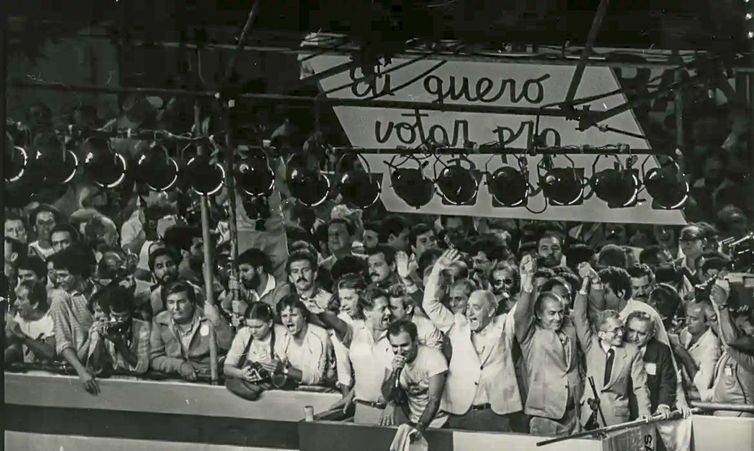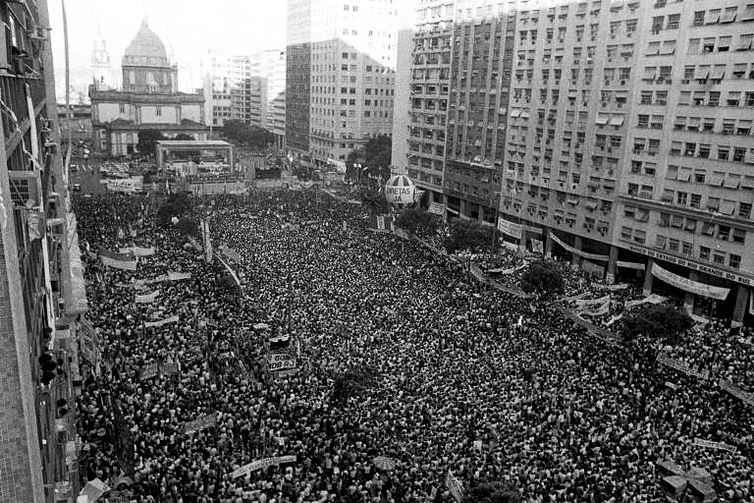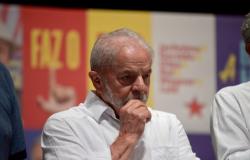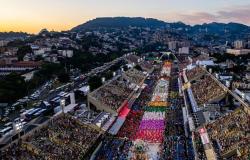40 years ago, on April 25, 1984, a vote in the Plenary of the Chamber of Deputies frustrated the expectations of a large part of the Brazilian population, who had hoped to be able to vote for president through direct elections. On that day, a proposed amendment to the Constitution to restore direct election for president from 1985, after 20 years of military dictatorship, was rejected by parliamentarians. 
The amendment, presented by then federal deputy Dante de Oliveira (PMDB-MT), had 298 votes in favor, 65 against, three abstentions and 113 absences. As it was an amendment, 320 votes in favor were needed to be forwarded to the Federal Senate.
“These 22 votes that the amendment did not have to be approved were decisive in throwing the population into a tremendous depression, which we saw on the streets”, recalls historian Vania Cury. Despite the “wake” atmosphere after the rejection of the amendment, the feeling was one of hope, according to her.


Diretas Já Rally – Photo: Vidal da Trindade/CPDoc JB
“The conversation among the leaders there, among the people who participated in the campaign, was ‘let’s not drop the ball, let’s continue fighting for direct elections’. But at first they ended up agreeing that Tancredo [Neves] was the candidate for the electoral college”, he recalls.
Journalist Ricardo Kotscho, who followed the vote, said that, despite the defeat of the amendment, the issue affected the country. “In any case, the movement was already victorious, because it mobilized the whole of Brazil, including the press, which little by little began to cover it,” he said, remembering the great public events that took place before the vote.
With the defeat of the Dante de Oliveira Amendment, the first election of a civilian president after the military dictatorship took place in the Electoral College, formed by members of the National Congress and delegates elected in the states’ legislative assemblies. The then opposition leader, Tancredo Neves, surpassed the then deputy Paulo Maluf, supported by the military regime, by 480 votes against 180.
After the death of Tancredo Neves, even before his inauguration, vice-president-elect José Sarney assumed the Presidency of Brazil. After the promulgation of the Constitution in 1988, Brazil returned to direct elections for president, with the election of Fernando Collor in December 1989.
The defeat of the Dante de Oliveira Amendment and the movement for Diretas Já in the country are the theme of the program Caminhos da Reportagem, which will be broadcast this Sunday (28), at 10pm, on TV Brasil.
Popular participation


Diretas Já Rally – Photo: EBC
The vote on the proposal for direct elections for president was preceded by a series of public events, which became known as the Campaign for Diretas Já. On January 25, 1984, more than 300 thousand people gathered at Praça da Sé, in São Paulo , with the mobilization of politicians, artists, athletes and workers from different categories.
One of the participants was retired metalworker João Paulo Oliveira, who also helped take other people to the rally. “We came by bus, we came by taxi, there were people who didn’t have money to come to the square, and we raised money for these people to come here too”, he remembers.
As the vote on the amendment in the National Congress approached, popular demonstrations became more crowded. On April 10, 1984, around 1 million people participated in a rally in Candelária, in the center of Rio de Janeiro, in one of the main acts of the Diretas Já movement.
Actress Lucélia Santos, a campaigner for amnesty for political prisoners, also went to Candelária that day. “All of Brazil was there at Candelária at that sunset. It was a confluence of positive energies, where art, artists, were effectively a part”, recalls the actress, who had become known for her role as the protagonist in the soap opera A Escrava Isaura, from 1976.
The last and largest Diretas Já rally took place in Vale do Anhangabaú, in São Paulo, and had 1.5 million participants. The event was on April 16, 1984, nine days before the vote on the amendment in Congress.
“The Anhangabaú rally, I think was the great watershed in Brazilian history between dictatorship and democracy. It was from that day on that Brazil was returning to democracy”, assesses journalist Ricardo Kotscho, then a reporter for the Folha de S.Paulo newspaper in 1984 and traveled the country covering the demonstrations for direct elections.


Diretas Já Rally – Photo: PSB
Among those participating in the event was also the then Corinthians player Walter Casagrande Júnior, one of the main names in the so-called Corinthian Democracy, a movement in which players and other team professionals decided, through voting, on issues such as concentration rules and even the hiring of athletes. He talks about the emotion he felt when going with other players to the rally and, even though they were recognized, the focus was not on the team or football.
“I was quite emotional already inside the subway, because people recognized us and didn’t talk about football, and I realized that everyone’s focus and thoughts were the same, it didn’t matter if I, Magrão [apelido do ex-jogador Sócrates]Vladimir [ex-jogador], we played for Corinthians, if the guy was a street cleaner, if the other one was a secretary, if the other one worked in the bakery, if the other one was an office boy. There, inside that subway, we were all the same, with the same thought, focusing on the direct issues, on the Dante de Oliveira Amendment”, recalls Casagrande.
* Thiago Padovan and Ana Passos, from TV Brasil









